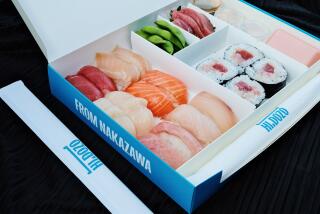World-Class Welcome Home for Ozawa : Music: A prodigal son, once boycotted in Japan, returns to cheers and a major festival.
MATSUMOTO, Japan — In 1962, maestro Seiji Ozawa walked onstage to conduct Japan’s NHK Symphony and found rows of empty seats. The members found the then-27-year-old too brash and demanding, and they boycotted him.
But 30 years later this past weekend, Ozawa came home to stage his native country’s first world-class classical music festival. Not only were all of his orchestra members present, so were the emperor and empress of Japan--just two fans among an adoring opening night audience of more than 2,000.
Ozawa has come full circle. He fled to America after the NHK debacle with “nowhere else to go,” as he puts it, determined to prove to himself and his fellow Japanese that he could make it abroad. Now he has returned a certifiable hero, determined to show the world that Japan can produce first-rate musicians and music festivals.
“Until now, all Western music has been imported into Japan,” Ozawa says. “Now we feel it’s time to export it back to the West.”
Ozawa’s vehicle is the Saito Kinen Orchestra, a 155-member group composed almost entirely of fellow Japanese who studied with the late music educator Hideo Saito, at the Toho Gakuen School in Tokyo. Many of the members, like Ozawa, left Japan and established international reputations abroad.
Under the shadow of the Japan Alps in the ancient castle town of Matsumoto, they came together again to stage a two-week festival featuring an orchestra concert and the opera “Oedipus Rex.”
For many Japanese, it was a return, of sorts, of their prodigal son.
“He has done his activities overseas, but now he realizes he is Japanese and has come back,” said Saburo Ako, Matsumoto festival chief. “They will show us what they have achieved abroad as Japanese.”
With such nationalistic pride, the Japanese have gone all-out to support the event. The Royal Family, usually prohibited from traveling outside Tokyo for cultural events, concocted a way to come to Matsumoto by proposing visits to local hospitals, festival planners said. (Empress Michiko, a longtime Ozawa fan, calls the maestro “Seiji-chan,” a term of endearment.)
Seiko Epson Corp. and other sponsors underwrote much of the festival’s $5-million cost. Nagoto Prefecture built a $60-million cultural hall. And the town of Matsumoto, 120 miles north of Tokyo, has spent the last two years planning the spectacular event, one Ozawa hopes to make an annual affair.
For the past month, local merchants have promoted the festival with posters and special displays of Ozawa books and CDs. Business appears to be booming. One music store, the Teito Musen, has sold about 100 Ozawa CDs in the last six weeks, compared to the usual five or so a month, manager Toshimi Yanase said.
Blue and green festival banners flutter from street posts, and the city is even piping Ozawa’s music through public loudspeakers.
Tickets sold out immediately; people began lining up two nights in advance. City Hall was bombarded with angry calls from those who lost out. Some even threatened not to pay their taxes, Ako said.
As consolation, the city erected an outdoor screen at Matsumoto Castle, where 2,000 people watched the opening night concert of Brahms, Tchaikovsky and the world premiere of a specially commissioned piece by Japanese composer Toru Takemitsu.
The opening performance drew standing ovations and numerous curtain calls for Ozawa. “It was unbelievable,” he said.
The flamboyant Ozawa, whose intensely emotional performances belie the traditional Japanese reserve, still finds some resistance in his native home.
But it wasn’t visible in Matsumoto over the weekend.
“I was moved to tears,” said longtime fan Takako Kita. “To see that Japan has really produced such a first-class orchestra was overwhelming.”
More to Read
The biggest entertainment stories
Get our big stories about Hollywood, film, television, music, arts, culture and more right in your inbox as soon as they publish.
You may occasionally receive promotional content from the Los Angeles Times.











